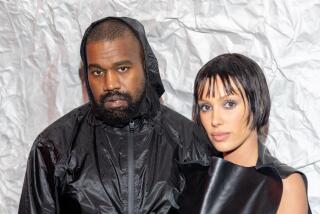Second coming of Pavement
Through the decade or so the band was together, the guys in Pavement did a lot that broke from the tradition established by classic rock bands and their boomer heroes.
Pavement tuned its guitars all wrong. Its members refused to make conventional sense, or to take their live shows too seriously. They avoided causes or political stands. They were neither slickly commercial nor rebelliously anti-commercial, but sort of stubbornly -- or passively -- oblivious.
And they were fiercely anti-nostalgic, rejecting rock’s usual blues or country building blocks. Their recent best-of disc, whose title comes from their song “Gold Soundz,” is called “Quarantine the Past.”
But this spring, Pavement joined a time-worn boomer tradition: the reunion tour. When four New York City shows, scheduled for this fall, were announced, tickets sold out instantly -- a full year early. In this way, they’re joining other post-punk and indie icons, such as Gang of Four and the Pixies.
The tour, which began in Australia and New Zealand last month, comes to the Coachella Music & Arts Festival on Sunday after a Thursday night warm-up at the Fox Theater Pomona.
“It’s just basically, the kids want to hear these bands,” said Bob Nastanovich, 42, Pavement’s percussionist and onstage prankster, who has made his living during the band’s hiatus in the world of horse breeding. “You just sort of appreciate that what you did mattered enough that they want you to do it again. It’s a welcome return to action.”
The band members are making clear that their reunion is different, and that it will not resemble those of never-say-die bands of the previous generation.
“Pavement’s always been a weird entity,” said guitarist Scott Kannberg, 43, whose pseudonym in the band was Spiral Stairs. “It’s been kind of on-and-off since we started.” Many of the group’s records were made while they were living in different cities, and its leader, Stephen Malkmus (who wasn’t available for this article), was a famously remote presence.
“I think people really want to do it,” Malkmus, 43, told GQ’s Chuck Klosterman. “I ... I want to do it. I mean, I don’t want to be the person who only kind of wants to do it. Our booking agent had a lot to do with it.”
Reunions typically take place for financial reasons, of course, but also because of warm, gauzy feelings between fans and the bands themselves. They’re the feelings that provoke Bic-lighter choruses, power ballads and “farewell” tours with band members hugging. But punk -- and the indie bands that took their cue from its idol-smashing style -- was less misty-eyed.
“If you take the music of the Pixies and Pavement, you have some of the most unsentimental music imaginable,” said Jeff Gordinier, a Details writer and author of the Generation X manifesto “X Saves the World.” “A lot of Gen X music aims to eradicate sentimentality, which they associate with a boomer sense of self-inflation and a utopian view of everything from saving the world to romance.”
Pavement was different. Its songs seemed to mean nothing, or everything: Unlike classic-rock bands that intoned lyrics about love and loss with poignant emphasis, Malkmus sang earnestly only when he got to the most nonsensical part of the song: “Praise the grammar police, set me up with your niece.”
And now this band, which never sold many records but influenced everyone from Blur to Animal Collective to Grizzly Bear, seems to be bigger than they ever were. The two-CD reissues of four of the band’s five original albums have sold well and attracted a new generation. “There are a lot more younger fans,” said Kannberg, “who say, ‘I was influenced by another band who talked about you.’ ”
But at the time of the band’s 1999 breakup, after Malkmus affixed a pair of handcuffs to his mike stand at a London show, it wasn’t clear that members of the group would ever speak to each other, much less play together, again.
“At the time, things felt so fractured for the band,” recalled Gerard Cosloy, co-owner of the group’s main label, Matador. “There was so much unhappiness on Stephen’s part -- I was personally happy for them to move on to whatever was next. The notion of a reunion someday didn’t really occur to me at the time.”
Some of what’s going on is just the inevitable return of a band people liked the first time and miss a decade later -- just like any other rock reunion. After all, pining for the brighter moments of one’s past is not unique to any generation or musical ideology: We all feel it. Throw in wars and a recession and we may feel it more than usual.
But longing for a band like Pavement can signify a yearning for something broader: a craving for the days when the indie ethos seemed to be taking over the world, when Nirvana and Teenage Fanclub were giving boomer icons a run for their money. It stirs indie-centric Xers like nothing else.
Of course, Gen X and its culture of independent labels and small publishers has fought its way out from under occupying armies before: Gen Xers grew up buried in talk about Woodstock, the British Invasion, “Happy Days,” “Gilligan’s Island” and the soundtrack for “The Big Chill.”
Gen X nostalgia, then, is essentially different from the earlier brand, in that it’s private, sub-cultural, instead of the mass-marketed public group hug that marks the boomer version. In a recent Slate story, Zach Baron called the Pavement reunion “the end of baby boomer cultural hegemony.”
Some punk and indie rockers have gotten together for longer than one tour, and even made new albums. But Pavement’s second honeymoon will likely be of briefer duration. Malkmus, who now lives in Portland, Ore., said that he barely thinks about music anymore, and that he is more into fatherhood and fantasy sports. “It’s an oddly good time,” he told GQ, “to put the Pavement thing to rest.”
Kannberg agreed: “I could never see Pavement being like the Eagles or Fleetwood Mac -- one of those endless package tours. We want to keep it simple. I’m not really a big fan of when bands get back together and record a new record. But you never know.”
--
More to Read
The biggest entertainment stories
Get our big stories about Hollywood, film, television, music, arts, culture and more right in your inbox as soon as they publish.
You may occasionally receive promotional content from the Los Angeles Times.






